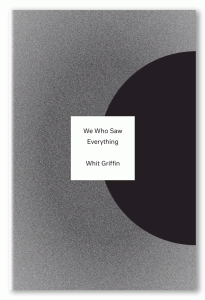Book Review

Whit Griffin’s We Who Saw Everything begins with a description of a ritual.
Beginning with the new moon
we bathed in the Euphrates twenty-
nine days. The soul breathes,
the sinews of Set provide the lyre
strings. Isis makes the navigable
unnavigable when it pleases Her…
Isis and Set belong to the Osiris myth of ancient Egypt: Set, Osiris’s brother, represents chaos, destruction, and disorder in most Egyptian myths. The Euphrates locates us in Mesopotamia, the lyre in Greece. Lyric order emergent from the body of disorder, mythic coherence rendered through a chaotic geography. The opening is synecdochial: the whole of this 3891-line, one stanza poem (or section of a poem—the volume ends with the words “End of Book One”) is a collage of sentences that mimic, extend, and quote instructional, mythological, and esoteric texts from around the world. Quoted lines are italicized, which means that one way to approach this book is via internet research, which turns up an eclectic mix of source texts including The Kybalion, The Decline and Fall of the Roman Empire, The Ancient Mysteries: A Sourcebook of Sacred Texts, The Golden Ass, Aleister Crowley’s The Book of Lies, a seventeenth-century witch-hunter’s manual called Compendium Maleficarum, an anthology of Native American songs and chants, and texts dealing with gardening and plant nomenclature. Griffin seems especially interested in secret knowledge: mysteries, hermeticism, the esoteric. The polyvocality that the collage element of the book creates is harnessed, via the charm of grammar, into a kind of choral unity. Like analytic philosophy, Griffin is interested in possibilities for meaning preloaded into syntax and grammatical mood. He is particularly fond of the declarative—“Paradise affords the unicorn lentils / and sugar cane. The moon controls the juices / of plants and the blood of men” —and of sentences that convey advice or give instruction—“stolen rue grows best.”
Griffin’s debt to the modernist epic seems clear, and the book’s introduction, written by Thomas Meyer, points to The Waste Land. But We Who Saw Everything has no Fisher King, no ur-myth underlying its choral music. Its unities (of tone, of syntax, of the theme of esoteric knowledge) drive the reader to acts of imaginative reconstruction, each of which is dismantled in turn by the poem’s commitment to surprise, to continual movement from one mythic frame to another. To read the book is to engage in an ongoing act of making and unmaking that sometimes slips into passive absorption. The most obvious motives for such a creation—which seems on the one hand to promise, as many of its source texts do, actual secret knowledge, and on the other to demonstrate in the sheer proliferation of so many promises their final hollowness—would seem to be either an affirmation or a denial of some final coherence, of Pound’s “rose in steel dust.” Halfway through the book I considered the possibility that it was an elaborate joke. (One of Griffin’s quoted texts, the 2007 bestseller The Secret History of the World by Jonathan Black, was widely disparaged by reviewers, most memorably by the novelist and nonfiction writer Hilary Mantel, as so much Da Vinci Code-inspired bunk.) But the book seems too earnest to be a joke, or even a joyfully vacuous postmodern bricolage. My abiding sense, reading it, was that it was motivated by the same desire for preservation or recovery that characterizes its source texts, but that what it seeks to preserve or recover is not knowledge but language: the particular syntactical possibilities given rise to by, say, belief in gods.
Absent a belief in gods, what occasion do we have for sentences like, “The / goddess of sustenance was the first to form tortillas.” To whom might one address the question, “How do the brittle stars feed?” From what perspective might this sentence be uttered: “A squirrel runs up and down / the ash, bearing words betwixt the eagle and the worm”? We Who Saw Everything seems not so much a compendium of esoteric knowledge as a chorus of lost grammars, a symphony of near-obsolete syntax. In this way the book’s nearest modernist relation seems neither Eliot nor Pound but Wallace Stevens, who thought poetry might preserve the “chant of paradise” even absent belief. “Memory,” Griffin writes, “is the tool with which the soul lays hold / of events as they pass by and preserves them.” We Who Saw Everything is a vast mnemonic for the event of our speaking of the secret, the mysterious, the dead.
About the Reviewer
Kristen Case teaches literature at the University of Maine at Farmington. She is the author of the critical study American Pragmatism and Poetic Practice: Crosscurrents from Emerson to Susan Howe (Camden House, 2011) and Little Arias, a book of poems (New Issues, 2015).